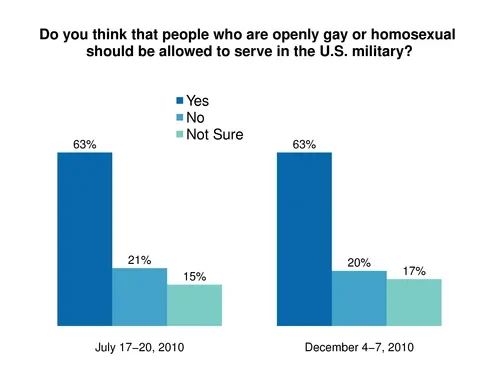In July, the Department of Defense hired a leading policy polling firm, Westat, to collect information from thousands of active duty and reserve Armed Services members on issues related to a potential change in the current policy of "Don't Ask, Don't Tell" when it comes to sexual orientation of U.S. military service members.
The Defense Department's report on the data collection project, released last week, concludes, "Consistently, about 30% said repeal of 'Don't Ask, Don't Tell' would have a negative effect," with most active duty and reserve members saying repeal would have no effect or a mixed effect, and about 15%-20% saying repeal would actually have a positive effect. Adults nationwide agree. When asked specifically about the effect on preparedness, unit cohesion and morale in the military, 24% of adults said repeal would have a negative effect, as do 26% of active duty and reserve service members on a baker's dozen questions focused on those same three areas.
Currently, the “Don't Ask, Don't Tell” law forbids openly gay men and women from serving in the military. If “Don't Ask, Don't Tell” were repealed, how do you think that would affect preparedness, unit cohesion and morale in the military?
| Economist/YouGov Poll | Department of Defense Poll* | |
|---|---|---|
Total respondents saying don't ask don't tell repeal would have a negative effect | 24% | 26% |
* Average results across 13 questions about preparedness, unit cohesion and morale asked of 115,052 active duty and reserve service members by Department of Defense | ||
The Department of Defense took pains to emphasize that theirs was not a "poll." The military does not conduct referenda among members to decide military policy. Nonetheless, because civilian political leaders control the U.S. military, public opinion on military policy matters such as "Don't Ask, Don't Tell" must be taken into account.
Most Americans, by a 3-to-1 margin, favor allowing openly gay or homosexual people to serve in the military. Sixty percent of those between the ages of 30 and 64, and 61% of those age 65 and older, favor that new policy. Pluralities of Republicans and conservatives favor rather than oppose allowing openly gay or homosexual individuals to serve.

Many proponents of repealing “Don't Ask, Don't Tell” objected to the Defense Department survey, not because it was or was not a poll of service members, but because they felt the questionnaire was biased. Now that the results are in, the survey clearly was not that biased, in that it did give service members a fair opportunity to indicate that few of them (between 25%-30%) expect any serious negative effects from changing policy and allowing gays or homosexuals to serve openly.
At the time the Defense Department's survey of active duty and reserve members was undertaken last July, adults nationwide, by a 54%-46% margin said they expected soldiers in the survey to be more supportive than military leaders to repealing “Don't Ask, Don't Tell”, because they'd prefer to end the secrecy that policy requires.
This month, the Department of Defense sent a 91-question survey to members of the military, asking their opinions about the effect of repealing the current policies, called "Don't Ask, Don't Tell." Just your best guess, thinking about the attitudes of young Americans such as those serving on active duty today, which of the following two statements comes closer to what you expect the Department of Defense will learn from this survey
| July 17-20 Economist/YouGov Poll | |
|---|---|
Soldiers are more supportive of repealing “Don't Ask, Don't Tell” than some of their leaders expect because soldiers are more comfortable serving with openly gay or lesbian members of their unit and prefer to end the secrecy required by “Don't Ask, Don't Tell” policies | 54% |
Soldiers will be so resistant to repealing “Don't Ask, Don't Tell” that the decision to allow openly gay and lesbian soldiers to serve in the military will have to be revised and “Don't Ask, Don't Tell” policies will be continued in order to keep most gays and lesbians out of the military | 54% |
In fact, critics of the Defense Department survey may have one good point about questionnaire bias: Throughout the 90+ questions in the survey there are not enough direct opportunities for active duty or reserve service members to state that current the “Don't Ask, Don't Tell” policy causes problems with preparedness, unit cohesion and morale - problems that repeal might solve.
While Americans overwhelmingly support allowing gay or homosexual individuals to serve in the military, including both middle age and elderly Americans, opinion is much more divided on the more interesting question of whether “Don't Ask, Don't Tell” policies (and not the repeal of those policies) cause problems with preparedness, unit cohesion and morale. Fully 52% of adults YouGov interviewed in July for the Economist magazine felt when it comes to preparedness, unit cohesion and morale, the current “Don't Ask, Don't Tell” policy causes more problems by requiring gay and lesbian soldiers to conceal their sexual preferences, and only 48% felt repeal would cause more problems in those areas because it would allow gay and lesbian soldiers to be open about their preferences.
Among 18-29 year olds, 63% said in July that current policy causes more problems with preparedness, cohesion and morale due to the need for some soldiers to keep secrets, while among those age 65 and older, 58% said repeal of current policy would cause more problems by allowing some soldiers to be open about their gay or lesbian sexual preference. Middle-age people were divided, roughly 50%-50%, on which causes more problems.







